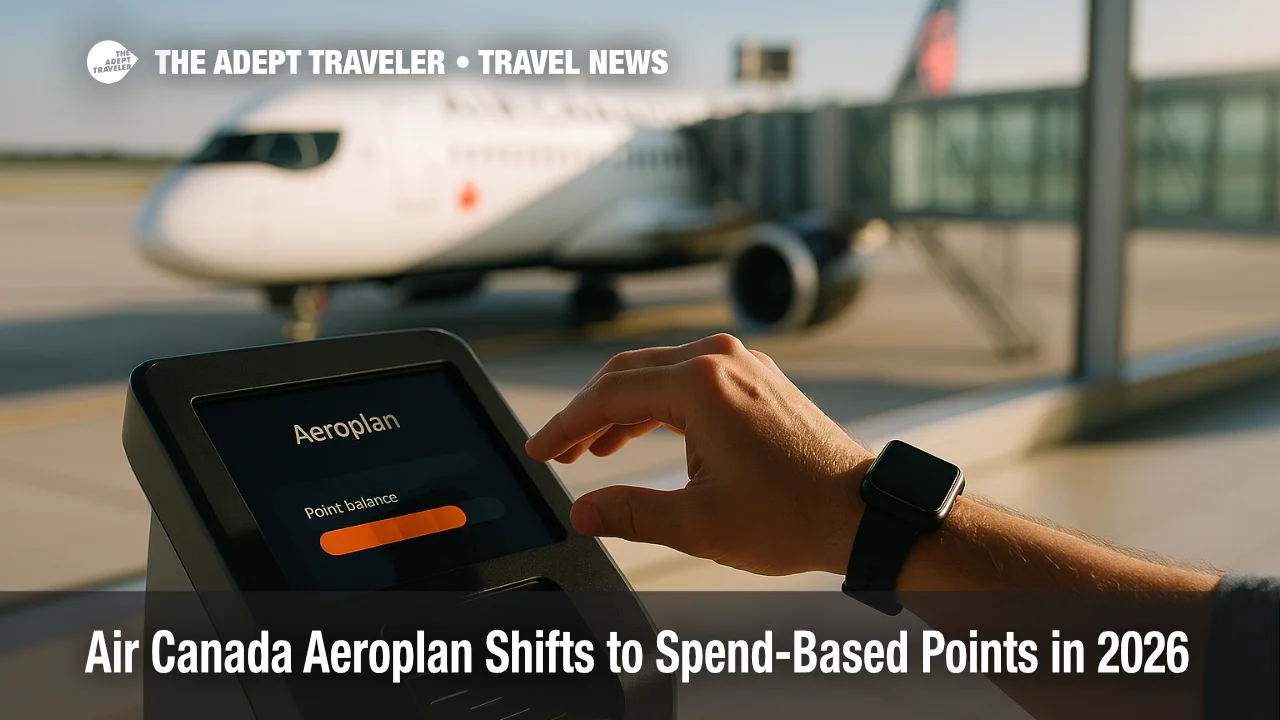Air Canada Aeroplan Shifts to Spend-Based Points in 2026

Air Canada will overhaul its Aeroplan loyalty program on January 1, 2026, swapping distance-based earning for points tied to how much travelers spend. A new metric, Status Qualifying Credits, will consolidate today's elite-status requirements into a single counter that rewards flight, credit-card, and partner activity. Core perks such as priority check-in and free checked bags stay put, but elite flyers will unlock extra benefits with every 10,000 SQC earned. The carrier promises a smoother path to status and richer rewards for high-revenue customers while preserving current rules through December 31, 2025.
Key Points
- Why it matters: High-spend travelers will earn more Aeroplan value per trip.
- Travel impact: Long-haul discount hunters may see slower status progress.
- What's next: SQC replaces SQM, SQS, SQD from January 1, 2026.
- Elite tiers keep core benefits, add rewards every 10,000 SQC.
- Credit-card and partner activity can contribute up to 50,000 SQC a year.
Snapshot
Beginning in 2026, members will earn at least one Aeroplan point per qualifying Canadian dollar spent on Air Canada fares, excluding taxes and third-party fees. Elites will collect multipliers of two to six points per dollar, depending on tier. Each fare will also accrue up to four Status Qualifying Credits per dollar, replacing today's trio of distance, segment, and dollar targets. Members may stack an annual 25,000 SQC from eligible Aeroplan credit-card spend and another 25,000 SQC via hotel, car-rental, and retail partners. Primary Aeroplan premium cardholders will receive a 10 percent SQC bonus on the prior year's total starting in 2027.
Background
Aeroplan last reset in 2020 when Air Canada repurchased the program and reintroduced mileage-based earning alongside generous partner redemptions. Many global carriers-including Delta Air Lines and Lufthansa-have since pivoted loyalty schemes to revenue models that prioritise fare paid over distance flown. Air Canada's existing elite ladder uses Status Qualifying Miles, Segments, and Dollars, forcing travelers to juggle three separate thresholds. The forthcoming SQC system simplifies progress, echoing trends at U.S. competitors while preserving Aeroplan's popular no-fuel-surcharge redemptions and family sharing features. Current qualification rules remain valid through 2025, giving members a full year to adapt.
Latest Developments
Spend-Based Earning Arrives for Air Canada Aeroplan
From January 1, 2026, every Canadian dollar spent on an eligible Air Canada ticket will earn at least one Aeroplan point. Taxes and fees are excluded, but carrier surcharges count toward the total. Aeroplan 25K, 35K, 50K, 75K, and Super Elite members will automatically receive tier multipliers, rising to six points per dollar at the top tier. Promotional bonuses will stack on top. The shift aligns Aeroplan with revenue-based peers and is designed to reward travelers booking premium cabins or last-minute fares, groups Air Canada says drive the bulk of its revenue.
Status Qualifying Credits Replace Three-Tier Metrics
Status Qualifying Credits will serve as a single path to elite status. Base economy flyers will earn one SQC per dollar, standard economy two, premium economy three, and business class four. Credit-card spend on Aeroplan premium products will generate one SQC per CA$5, up to 25,000 yearly. Partner transactions-ranging from hotel nights to car rentals-can contribute an additional 25,000 SQC. Members unlock "Everyday Benefits" such as eUpgrades, preferred-seat vouchers, or Maple Leaf Lounge passes at each 10,000-SQC tier, adding gamification to the program.
Analysis
Air Canada's move mirrors a broader industry pivot toward revenue-based loyalty. By rewarding dollars rather than miles, the carrier reduces costs tied to deep-discount fares and encourages upselling to higher fare families. Frequent long-haul travelers buying sale tickets-once the backbone of distance-based programs-may need to rethink strategies, while business travelers and premium-cabin vacationers should gain status more quickly. The blended earn from flights, cards, and partners keeps Aeroplan competitive with Delta's Medallion Qualifying Dollars and United's Premier Qualifying Points systems, yet the 10,000-SQC gamified tiers may attract casual flyers seeking immediate gratification. For Air Canada, consolidating metrics simplifies member messaging and yields clearer revenue forecasting. However, the carrier must balance perceived devaluation for economy flyers by maintaining strong redemption value and transparent award charts. The shift could also spark competitive responses from WestJet and Porter, pressuring Canada's loyalty landscape to evolve.
Final Thoughts
Spend-based earning and the new Status Qualifying Credits mark the most significant Aeroplan redesign since 2020. Travelers inclined to pay for comfort will see faster rewards, while mileage runners may pivot to partner airlines or credit-card strategies. As 2025 qualification rules remain intact, members have time to maximise current thresholds before the switch. Monitoring award pricing and partner redemption rates will be crucial to safeguarding value once Air Canada Aeroplan fully embraces revenue metrics.
Sources
- Air Canada Redefines How Members Earn Aeroplan Points and Achieve Aeroplan Elite Status, Air Canada
- Air Canada Aeroplan moves to spend-based points earning and elite status - what it means for US travelers, The Points Guy
- Aeroplan Changes How Members Earn Points Toward Elite Status for 2026, Travel Market Report
